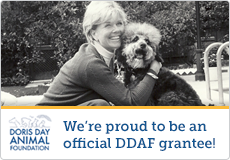Tips on keeping your animals safe during the cold weather months
Posted: 12/10/2013
- By: Kristen Skladd
(WXYZ) – Temperatures have taken a deep dive in metro Detroit! It feels like zero with the wind chill. It’s important to make sure your pets are kept safe and warm from the harsh cold.
Local rescue group, The Animal Care Network , is issuing a warning for all pet owners, as we begin to enter the winter season. Make sure to take the necessary precautions so that you can keep your furry family members in tip-top shape.
Outdoor elements such as wind and precipitation can lead to illness, hypothermia and death among animals. Dogs and cats are prone to frostbite on their feet, ears and tails and can suffer within a matter of minutes.
If you know someone who keeps their pet outdoors, persuade them to bring the animal inside.
Local laws do require that dogs kept outside must have proper shelter, including a non-oversized dog house, preferably with a wind flap, to help the canine maintain body heat. Blankets and towels will freeze when used inside of a dog house, so dry straw is recommended instead. Water bowls will also freeze, so check periodically that the water is fresh and flowing. Make sure the dog house is facing away from the wind, as well as elevated so the bottom does not freeze.
Similarly, feral cats also need shelter and protection from the bone-chilling temperatures and affecting elements. Cats may freeze, become lost or injured, or even climb into the bottom of a warm car for warmth. Meanwhile, salt and other chemicals can also become irritating to the pads of an animal’s feet.
Because extra weight on a cat or dog adds warmth, doubling up on food is recommended.
Lastly, recognize the signs of hypothermia in animals including excessive shivering. Dogs shiver in order to produce body heat and will also breathe abnormally slow. Other signs include a dropping heart rate due to muscle stiffness as well as a loss of coordination. Dilated or fixed eyes and pale gums also may signal the onset of hypothermia.
Immediate treatment of hypothermia is critical. A veterinarian should be sought out immediately.
The Animal Care Network suggests that if you see an animal outside shivering and braving the cold, become that animal’s advocate. Speak with the owner first and if needed, contact your local animal shelter.




